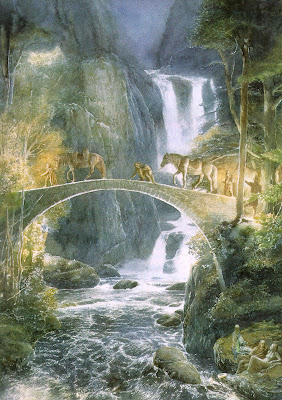Keep reading the book and get as much of Chapters 3-5 read for Tuesday, especially since we won't have class on Thursday (Scissortail CW Festival!). I strongly encourage everyone to go to at least one session of the festival, since is the LARGEST writing festival in the state, and many famous and award-winning writers come here each year, including 3 US Poet Laureates (and poet laureates of Texas, Oklahoma, and Missouri), and several people who have been nominated for Pushcart Prizes, Oklahoma Book Awards, and National Book Awards. The complete schedule of the festival is here: scissortail creative writing festival: 2022: Schedule of Readings (ecuscissortail.blogspot.com)
Here are some ideas to consider for your reading this week:
* Why is Tolkien so meticulous in charting the hobbits' journey through the Shire? Why does he make sure you can almost chart their past through the area as if it's a real place (and indeed, you CAN follow it on the map in the front of your book).
* How are the Elves characterized in Chapter Three? How do they contrast with the hobbits? Are they different from the Elves we briefly met in The Hobbit?
* What makes Frodo so hesitant to leave the Shire despite what Gandalf has told him about the Enemy and the Ring?
* What is unique about Tolkien's narrative style? How does this work contrast from other works of fantasy, or from other novels in general? Why might it ocassionally remind us of earlier works from class, such as Beowulf and Gawain?
* How do Peregrin "Pippin" Took, Meriadoc "Merry" Brandybuck, and Samwise Gamgee show us a different side/character of hobbits than what we've seen in Bilbo/Frodo? What makes them different? Consider that Samwise means "half wise," or "half wit," "Meriadoc" is a knight from King Arthur's court (and "Merry" means "jolly), and Peregrin means "pilgrim" or a "hunting falcon."
* How does Tolkien characterize the Black Riders? How do we know they're not quite human without seeing them at all?
* What does Frodo learn from his encounter with the Elves, and specifically, from Gildor? Why might he not be ready to appreciate this Elf-Knowledge?
* Do songs have the same function in this book as in The Hobbit? Why are they used so frequently?
* If you know the movies, how did the first film depart significantly from these three chapters? What did they alter or leave out (and why, do you think)?

No comments:
Post a Comment